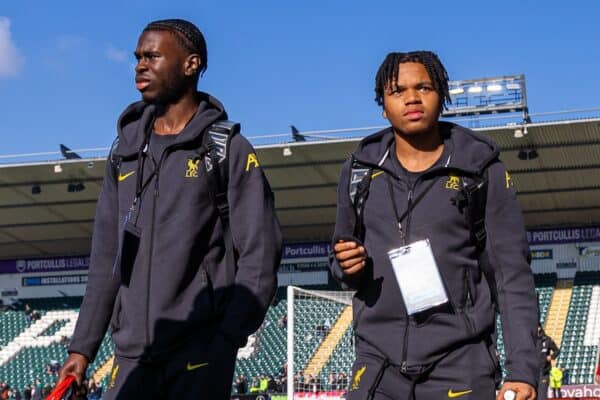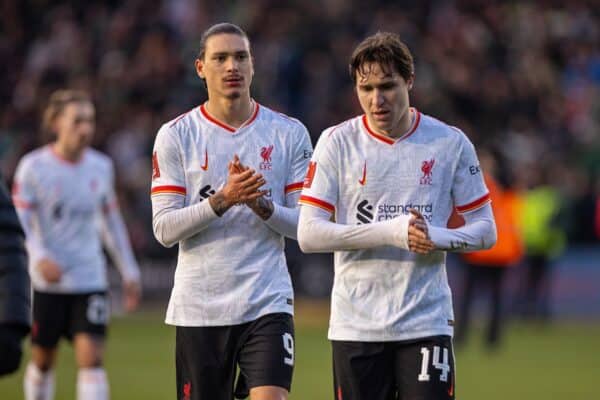A drive to Plymouth is not a short one by any means for Liverpool supporters, but Steven Scragg made the journey and here is what he made of the Reds’ FA Cup exit.
Just when you’re basking in the glow of wider opinion that Liverpool are effectively the best team on the face of the planet, it is life-affirming to experience a day that confirms football will always find a way of biting your hand, should you dare to take the game for granted.
During the Dalglish, Souness, Evans, Houllier and Benitez eras, I used to travel everywhere watching the Reds, but then the role of fatherhood dawned and life kind of escalated rapidly.
When the advent of the £30 away ticket kicked in just as I’d taken my eye off the credits ball, it meant that away Premier League games also became a thing of the past for me. But I did manage to remain lucid enough to keep my away FA Cup loyalty up, meaning that across the last decade and a half I have embraced the tournament’s awaydays for all their worth.
Having missed the 2017 trip to Plymouth due to ill health, I was always going to jump at this one, if only to tick off ground number 70 out of the current 92 teams of the Premier League and Football League, all in the name of stadium geekery.
The magic has changed

FA Cup finals are great things to be an active part of as a supporter, more so when you win them obviously, and there is something defiantly wondrous about rocking up at Goodison or Old Trafford and claiming 15 percent of the tickets in what feels like a call to arms.
But the best part of the competition is those trips to stadiums that aren’t part of the often repetitive cycle of ones you visit on league weekends.
Across my Liverpool watching years, alongside the more familiar outposts, I’ve been lucky enough to have a ticket for games at places like the Goldstone Ground, Bootham Crescent, Oakwell, the Victoria Ground, Brunton Park, the Vetch Fiel and Gresty Road.
Plus Twerton Park, Burnden Park, Ashton Gate, Gay Meadow and the New Meadow, Vale Park, Huish Park, Deepdale, Field Mill, Kingsmeadow, St James Park (Exeter City version), and now Home Park, along with one or two entirely forgettable Meccano new builds.
Misadventure of result and performance aside. Home Park makes it 70/92 league grounds and counting. pic.twitter.com/tWCflp6WHh
— Steven Scragg (@Scraggy_74) February 10, 2025
Some of these stadiums are now long gone, which makes their ticked box even more valuable to have marked off.
But, at the same time, the contemporary approach to the FA Cup by modern coaching thinking, an approach that arguably now stretches across half of my lifetime, takes something away from the wider aura of the competition.
Not exactly a groundbreaking opinion, I admit, but we all know that the ‘Magic of the FA Cup‘ is now an exceptionally rare commodity and has been for decades.
To younger generations that have been brought up on a diet of the Premier League and Champions League being all-consuming megaliths, and the rest of football being a trivial distraction by and large, it may come as a surprise to hear that the FA Cup used to provoke sleepless nights and cold sweats.
It was a competition with a defined sense of peril. The magic was very real.
Yes, there was always the tried and tested line of “well, at least we can concentrate on the league now,” from where we would actually go on to fulfil the prophesy of throwing the First Division trophy from player to player around Anfield in May.
But an FA Cup exit still stung, and throughout the first half of the 1980s, it was quite the irritation that we couldn’t quite scratch. At least not until 1986.
Now the sentiment is very different. Three days prior to the trip to Devon, Liverpool had already obtained themselves a trip to Wembley for the League Cup final.
Pragmatic Reds


With the rearranged Merseyside Derby looming on Wednesday, it was no surprise to undertake the five-hour drive to Plymouth only to be greeted by news of a lineup that looked like the back end of a Ford Cortina welded onto the front end of a TR7.
What the fourth round of the FA Cup used to represent was the second precarious hurdle of the competition, one which the successful clearing of would give rise to the hope of a kind home draw being plucked out of the velvet bag for the fifth round by some ancient relic of a stuffed shirt.
From there, if you squinted just about enough, you could vaguely make out the silhouette of Wembley’s twin towers, a visage that would lend to daydreaming about a sunny Saturday in May; and the curve of that shadow from the roof of the Wembley stands; and the long walk from the tunnel end for the players as they waved to family members in the crowd.
However, the jumpers for goalposts era has long gone and the fourth round of the FA Cup now represents a gamble worth making.


Crucial league and European games await us, as does a trip to Anfield South to contest the final of English football’s other domestic cup competition.
Pragmatism means 10 changes are made to the starting line-up, and a glance at the list of substitutes has you scratching your head trying to work out who one or two of the names are.
On Sunday, we were dealt the sucker punch that lands from time to time when you go up against determined opponents that are quite rightly grabbing their 90 minutes of national fame against a bigger team with an incohesive collection of familiar faces and hopeful youngsters, that are struggling to form a footballing chemistry together.
Plymouth deserved their win, while Liverpool got their just deserts.


The excitable home support will remember it forever and a day, and so they should. They’ll also likely see their team lose in the league on the very same pitch to Millwall while we’re doing battle in the last-ever Merseyside Derby to take place at Goodison.
It’s the way of the footballing world.
As I meandered back to my car after the game it wasn’t a journey I made with the weight of defeat resting on my shoulders, although even that in itself was loosely unsettling given that as a kid an FA Cup exit hurt for weeks, it was more a question of making sure I got some petrol for the long trip home before I got to the M5.
Hence, through mine, and I’m sure the eyes of many of us who lived the glory days of yore, an FA Cup tie now is all about ticking another ground from the list and muted disappointment when we’re drawn to play at home, yet enjoying the party should we find ourselves running round Wembley with the cup.
Same again next year.










